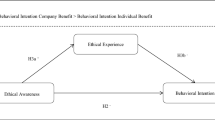Abstract
We analyse Irish managers' perceptions about the degree of wrongness of ten types of unethical conduct. In-person interviews with 348 managing directors of Irish-owned businesses who report their perceptions of the degree of wrongness of ten business ethics problems (the dependent variables) yield the data for our study. Predictors of managers' ratings include the existence of a business code of ethics, perceived frequency of occurrence of the given acts, company size and sector, union membership, Irish business ownership and independence (the independent variables). Results indicate that approximately 75% of those sampled are independent Irish owned businesses but few (only 22% of this sample) have a formal business code. Regression analyses reveal that small firms with a code of ethics predict higher wrongness ratings for managers in regard to the practices of unfair pricing and delayed payments (unethical behavior involving firms) but managers also consider such acts the least wrong overall. Wrongness ratings on the eight remaining unethical acts are explained by the manufacturing sector. However, manufacturing firms in Ireland also have a high percentage of unionised workers indicating that unions influence managerial thinking about social and employee ethics (e.g., discrimination, insider trading). The traditional adversarial Industrial Relations model is useful in noting that unions are important in setting ethical standards for indigenous Irish-owned businesses. Given this reality, management in small, manufacturing firms should work with unions to create a more formal ethics code in order to guard against corruption and to remain competitive in the international marketplace. Those without strong unions might articulate their own organisational values.
Similar content being viewed by others
References
Alderson, S. and A. Kakabadse: 1994, ‘Business Ethics & Irish Management: A Cross Cultural Study’, European Management Journal 12(4), 432–440.
Beauchamp, T. L. and N. E. Bowie: 1993, Ethical Theory and Business, 4th Ed. (Prentice Hall, Englewood Cliffs, NJ).
Beyer, J. M. and H. M. Trice: 1987, ‘How an Organization' Rites Reveal Its Culture’, Organizational Dynamics 15(4), 5–24.
Brady, F. N.: 1990, Ethical Managing: Rules and Results (Macmillan, New York, NY).
DeGeorge, R. T.: 1995, Business Ethics, 4th Ed. (Prentice Hall, Englewood Cliffs, NJ).
Dean, P. J.: 1993, ‘A Selected Review of the Underpinning of Ethics for Human Performance Technology Professionals – Part One: Key Ethical Theories and Research’, Performance Improvement Quarterly 6(4) 3–32.
Derry, R.: 1987, ‘Moral Reasoning in Work-related Conflicts’, in W. C. Frederick and L. E. Preston (eds.), Research in Corporate and Social Performance and Policy (JAI, Greenwich, CT).
Derry, R. and R. M. Green: 1989, ‘Ethical Theory in Business Ethics: A Critical Assessment’, Journal of Business Ethics 8, 521–533.
Donaldson, T. and P. H. Werhane: 1983, Ethical Issues in Business, 2nd Ed. (Prentice-Hall, Englewood Cliffs, NJ).
Frederick, W. C., K. Davis and J. E. Post: 1988, Business and Society, 6th Ed. (McGraw-Hill, London).
Maclagan, P. W.: 1983, ‘The Concept of Responsibility: Some Implications for Organizational Behavior and Development’, Journal of Management Studies 20(4), 411–423.
Murphy, P. E.: 1995, Top Managers' Views on Corporate Ethics. Irish Marketing Review 8, 61–72.
Murphy, P. E.: 1994, ‘European Managers' Views on Corporate Ethics’, Business Ethics: A European Review 3, 137–144.
O'Toole, F.: 1994, ‘A “Profound Statement” on Public Life in Ireland’, Irish Times (August 11).
Robertson, D. C. and B. B. Schlegelmilch: 1993, ‘Corporate Institutionalization of Ethics in the U.S. and Great Britain’, Journal of Business Ethics 12, 301–312.
Roche, B.: 1996, The New Competitive Order and the Fragmentation of Employee Relations in Ireland. Working Paper, UCD. Center for Employment Relations and Organisational Performance.
Thornton, G.: 1996, February 16, Late Payments Remain a Problem for Irish SMEs. Press release from Grant Thornton' European Business Survey.
Trevino, L. K.: 1986, ‘Ethical Decision Making in Organizations: A Person-situation Interactionist Model’, Academy of Management Review 11(3), 106–117.
Trevino, L. K.: 1990, ‘A Cultural Perspective on Changing and Developing Organizational Ethics’, Research in Organizational Change and Development 4, 194–230.
Trevino, L. K. and K. A. Nelson: 1995, Managing Business Ethics (John Wiley and Sons, Chichester).
Author information
Authors and Affiliations
Rights and permissions
About this article
Cite this article
Stohs, J.H., Brannick, T. Code and Conduct: Predictors of Irsih Managers' Ethical Reasoning. Journal of Business Ethics 22, 311–326 (1999). https://doi.org/10.1023/A:1006017724977
Issue Date:
DOI: https://doi.org/10.1023/A:1006017724977




